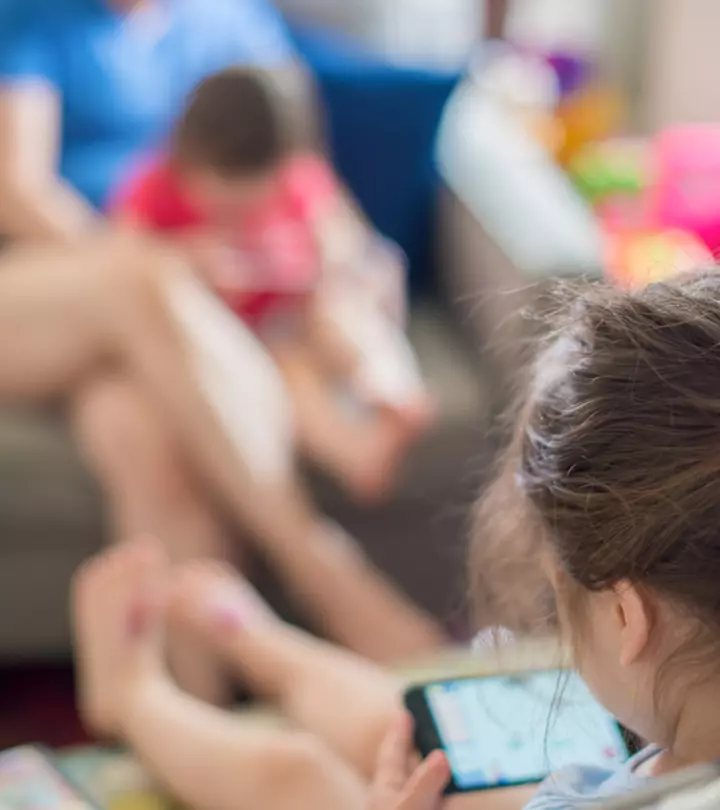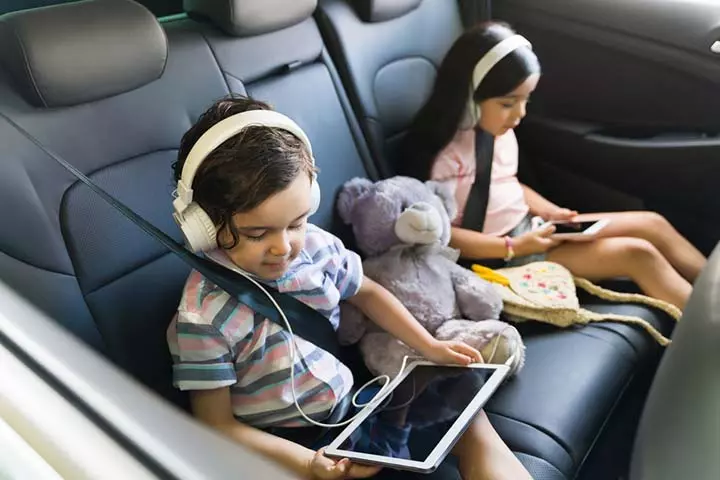
Image: Shutterstock

At what age should kids get a phone? The most common concern amongst most parents of the current era. A cell phone has become a necessity in current times. It offers several benefits, including a telephone, computer, alarm clock, television. And children know how to use it without even being taught. In addition, this device provides them unlimited access to cartoons, social media, and video games. But, no matter how tech-savvy, that does not mean they can own a mobile phone?
Here we talk about at what age a child should get a cell phone and the benefits and drawbacks of mobile phones, so you can decide whether or not your child is ready to have a phone.
Key Pointers
- The Pew Research Organization states that the ideal age to get a child a phone is 12–14 years; however, the final decision lies with the parents.
- Some benefits of cell phones are that they act as a safety tool, inform about the latest technologies, and help with education.
- However, cell phones may affect brain development and reduce social interaction.
- Tips on how children of different age groups should use cell phones are given below.
What Age Should Children Get A Phone?
There are no governmental guidelines on when a child should get their smartphone as it is an individual family decision.
A report from Common Sense Media reveals that the percentage of teens aged 13-18 who possessed a smartphone in 2025 increased to nearly 88%, up from 84% in 2019. The report also notes a significant surge in smartphone ownership among 8 to 11-year-olds, although only a few have their own devices. Furthermore, ownership rates of smartphones among adolescents aged 14 to 18 were either at or above 90%, indicating a persistent trend of growing smartphone ownership among young people.

Smartphone ownership among US children based on age
Source: Comparison of smartphone ownership among children in the US: 2015 vs. 2025The Pew Research Organization notes that the ideal age could be 12-14 years. Their survey reveals that 73% of parents find it acceptable for children to have a phone at 12 or older. Additionally, 45% believe smartphone ownership is suitable for ages 12 to 14, and 28% for ages 15 to 17. Only 22% of parents are okay with children under 12 having a phone.
Nevertheless, the ultimate decision to provide a phone before this age or beyond lies with the parent and depends on a child’s sense of responsibility, self-control, and maturity levels (1).
If the situation demands and you have to provide your child with a phone before the child is 12, prefer a basic phone with no or restricted internet connectivity or set child locks on inessential applications.
 Experts say
Experts sayHow Should Children Use Cell Phones As Per Their Age?

Image: Shutterstock
It is impossible to steer children away from those shimmering cell phone screens in a world surrounded by advanced mobile technology. Nevertheless, you can control the activities on the device, and the time it is used for. The following age guide by the American Academy of Child and Adolescent Psychiatry could help you regulate your child’s phone usage (2).
- Ages two and below: Children of this age shouldn’t be given a phone. You may occasionally use it to connect with other family members and friends via video calls. For children above 18 months of age, you may show them a few educational videos under your supervision.
- Ages two to five: Children of these ages may start to recognize that phones can be used as entertainment platforms. Restrict such entertainment usage of phones under your supervision.
- Ages six to twelve: During this age, your child may start to understand the various platforms on the internet. By no means must you let your child have access to social media. The child’s critical skills are still developing at this age, and they are incapable of handling the negative effects that may come with it. You may allow your child to access other functions and watch educational videos. However, you should be monitoring the activities conducted on the phone, have screen-time limits, and exercise strict parental control on each application they use (3).
- Ages twelve and above: Most children around this age would have a developed prefrontal cortex that is responsible for good decision-making skills, involving moral values like honesty and trust. Hence, at this age, based on your child’s maturity level, you may advance to a partially supervised usage of a phone with limited internet access. However, social media usage, if any, should be carefully monitored. Despite the connectivity social media brings, it may also make a child vulnerable to cyber-bullying (4) (5).
Overall, to ensure the responsible use of cell phones, family rules should be in place to deal with excessive screen time. Despite the connectivity, the negative effect of social media on children is undeniable as it may also make a child vulnerable to online predators, compromise privacy, and raise cyber security and cyber-bullying issues.
What Are The Benefits Of Cell Phones For Children?
A child’s life with a phone is not entirely a train wreck. Access to these digital devices may give your child the following benefits (6).
- Safety tool: Most mobile devices these days are equipped with location trackers. This unfettered access to a child’s location is a relief to many parents and is also one reason that prompts a parent to purchase a phone for their child. It also benefits your child as they get to enjoy their freedom without compromising on their safety. They could also contact you in case of emergencies.

Image: IStock
- Technological guide: The future is all about technology. Optimal exposure to cell phones would help children keep up with the latest technologies, learn new skills, and find their stepping stone in the current internet-led times.
- Educational aid: The internet offers the advantages of online learning and educational resources by providing unlimited access to information, which contributes to improving digital literacy. With so many online study platforms, your child could resolve the queries arising during their homework time from an expert. They could also seek assistance on any subject matter within a matter of minutes. Another source of fun learning is educational online gaming that can be used to gain knowledge.
- Social assistance: Social media networks also provide a few benefits as they could be an ideal place for your child to stay connected with friends and family members. It is essential that the child stays in touch with only those they and you know in the real world through online communication. You could take the help of parental control apps to ensure your child doesn’t fall prey to cyber-bullying while they develop their friendships and improve their social skills.

Image: Shutterstock
- Responsibility token: It is no lie that a phone is an investment, and hence your child must keep it safe. Since they may view the cell phone as a prized possession, you could use it as an opportunity to teach them independence and responsibility. You may also put them on the family plan and use their smartphone privileges to teach them about budgeting and controlling.
What Are The Drawbacks Of Children Having Cell Phones?

Image: IStock
As good as the benefits of using a cell phone may seem, the negative effects of mobile phones on kids should also be discussed. Excess usage of cell phones by children can be a source of distraction leading to several issues.
- Alteration of brain development: Excess usage of cell phones may result in premature thinning of the prefrontal cortex. Eventually, this thinning could decrease social and cognitive skills affecting their mental health and leading to anxiety and depression. A few studies also suggest that cell phone radiation could lead to brain tumors (7).
 Point to consider
Point to consider
Image: Shutterstock
- Reduction of social skills: The more time a child spends on cell phones, the less time they may spend with their friends and family. They may also stop participating in extracurricular activities in schools and spend time on their phones instead, affecting their social and critical thinking skills (8).
- Exploration into the dark web: The other coin of the internet includes the world of the dark web. Any unrestricted recreational screen time could give them access to the dark internet that is filled with explicit content. In addition, it may lead to the development of unsuitable online relationships (8).
- Phone addiction: Dopamine is a rewarding hormone that is released after a favorite activity. Smartphones could serve as an easy source of dopamine. This easy supply means that a child may resort to using a phone for instant happiness, ultimately getting addicted to it. The technology addiction may also prevent them from participating in physical activities, pushing them towards a sedentary lifestyle (9) (10).
Alternatives To Smartphones
The balanced use of smartphones is the key. Some interesting alternatives to smartphones may include:
- Screenless cell phones: This allows you to stay connected with your child without the requirement of screen exposure.
- Audio players: Digital audio players can come in handy for the purpose of listening to music, podcasts, or audio stories.
- Ebook devices: These devices have screens that are quite different from the ones used in smartphones. They can be a fun way to introduce children to stories, language, and other educational content.
- Smart watches with GPS: The ones that come with no social media apps are more suitable for kids. These have parental control and can be easily strapped to your child’s wrist. They have functions such as tracking and calls.
Frequently Asked Questions
1. For how many hours can children use a phone safely?
According to the Indian Academy of Pediatrics (11)
- Children below two should not be exposed to any screen except for video calls to their families
- Children between the ages of two and five may be given an hour of screen time
- Older children and adolescents can have two hours of screen time apart from online classes
2. How should I control my child’s phone addiction?
You may control your child’s phone addiction by (12)
- Maintaining smartphone usage schedule
- Not using smartphones to distract or reward children
- Prioritizing things such as homework, studies, outdoor activities, etc.
- Involving children in walking, exercising, and stretching
- Finding other ways to bond with children, such as cooking, cleaning, or gardening
- Encouraging face-to-face communication
- Being a good role model
3. What are the consequences of not giving a child a phone when all their peers have one?
Not giving your child a phone can have several drawbacks, including social isolation, difficulty staying connected and limited access to information. The positive aspects of not giving your child a phone are that you will shield them from issues like cyberbullying and addiction to their phone. However, even if you’re giving a phone to your child, it is crucial to keep a tab on time and usage.
4. What should parents do if they find their child is misusing their phone?
You should have a set of rules in place as soon as you give your child a phone, as well as fear of punishment the child will face if they do not abide by them. Take the device away from them for a stipulated amount of time, or you can assign them extra household chores for their mistake. You can also install child locks and limit their data access.
5. Is there a correlation between phone usage and academic performance?
According to a study conducted on high school students in Tennessee, there is no relation between phone usage and academic performance. Although the use of a phone at an early age has pros and cons, it is left up to the parents’ discretion to regulate the time duration and tasks for which their child uses a phone (15).
Various factors influence parents’ decision to give their children a mobile phone. These factors include the child’s maturity, responsibility, and self-control. Giving your child a mobile phone can help you track your child’s safety and education. However, it also gives them unhindered access to video games, YouTube videos, and abusive content that can harm them. Hence, discuss the pros and cons of giving a phone to your children with your partner to decide if it is necessary for your ward at this stage of their life.
Infographic: Benefits And Drawbacks Of Cell Phones For Children
In today’s digital age, where many activities rely on apps and mobile devices, keeping your child away from cell phones is nearly impossible. While there is much discussion about the disadvantages of mobile phones, there are also some advantages. The infographic below covers the pros and cons of cell phone usage for children.
Some thing wrong with infographic shortcode. please verify shortcode syntaxIllustration: At What Age Should Kids Get A Phone? Benefits And Drawbacks

Image: Stable Diffusion/MomJunction Design Team
Smartphones are changing the way our children and teens think and interact. Learn how these devices are affecting their brains in this informative video.
References
- Parenting Kids In The Age Of Screens.
https://www.pewresearch.org/internet/2025/07/28/parenting-children-in-the-age-of-screens/ - Screen Time And Children.
https://www.aacap.org/AACAP/Families_and_Youth/Facts_for_Families/FFF-Guide/Children-And-Watching-TV-054.aspx - At What Age Can My Child Start Social Networking?
https://www.internetmatters.org/resources/what-age-can-my-child-start-social-networking/ - Johnson S.B. et al.; Adolescent Maturity and the Brain: The Promise and Pitfalls of Neuroscience Research in Adolescent Health Policy.
https://www.ncbi.nlm.nih.gov/pmc/articles/PMC2892678/ - Funahashi. S. Prefrontal Contribution to Decision-Making under Free-Choice Conditions.
https://www.ncbi.nlm.nih.gov/pmc/articles/PMC5526964/ - Children And Cell Phones: Weighing The Risks And Benefits.
https://www.nationwidechildrens.org/family-resources-education/700childrens/2018/10/children-and-cell-phones - Children and Cell Phones: Is Phone Radiation Risky for Kids?
https://www.center4research.org/children-cell-phones-phone-radiation-risky-kids/ - Wilmer H. H. et al. Smartphones and Cognition: A Review of Research Exploring the Links between Mobile Technology Habits and Cognitive Functioning.
https://www.ncbi.nlm.nih.gov/pmc/articles/PMC5403814/ - Dopamine Smartphones & You: A Battle For Your Time.
https://sites.harvard.edu/sitn//flash/2018/dopamine-smartphones-battle-time/ - How Smartphones Hijack the Brain.
https://www.brainfacts.org/neuroscience-in-society/tech-and-the-brain/2025/how-smartphones-hijack-the-brain-010821 - Ten tips for cutting down on screen time during the COVID-19 pandemic.
https://www.unicef.org/india/parentingtips/ten-tips-cutting-down-screen-time-during-covid-19 - 14 Creative Ways To Break Your Child’s Smartphone Addiction.
https://www.narayanahealth.org/blog/14-creative-ways-to-break-your-childs-smartphone-addiction - When Should You Get Your Kid a Phone?
https://childmind.org/article/when-should-you-get-your-kid-a-phone/ - Children and Teens and Cell Phones.
https://www.fda.gov/radiation-emitting-products/cell-phones/children-and-teens-and-cell-phones - Russell Bennett; (2025); Relationship Between Smartphone Usage and Academic Performance of High School Students.
https://mcstor.library.milligan.edu/server/api/core/bitstreams/a5a9d97a-410c-4e01-b5d1-73dcc83cc53f/content
Community Experiences
Join the conversation and become a part of our nurturing community! Share your stories, experiences, and insights to connect with fellow parents.
Read full bio of Catherine Mok
Read full bio of Sindusha MS
Read full bio of Dr. Ritika Shah
Read full bio of Apoorva K

















